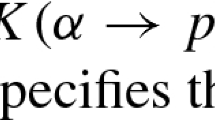Abstract
This paper presents a generalized form of Fitch’s paradox of knowability, with the aim of showing that the questions it raises are not peculiar to the topics of knowledge, belief, or other epistemic notions. Drawing lessons from the generalization, the paper offers a solution to Fitch’s paradox that exploits an understanding of modal talk about what could be known in terms of capacities to know. It is argued that, in rare cases, one might have the capacity to know that p even if it is metaphysically impossible for anyone to know that p, and that recognizing this fact provides the resources to solve Fitch’s paradox.
Similar content being viewed by others
References
Brogaard, B., & Salerno, J. (2004). Fitch’s paradox of knowability. In E. N. Zalta (Ed.), The stanford encyclopedia of philosophy. http://plato.stanford.edu/archives/sum2004/entries/fitch-paradox/.
Brogaard B., Salerno J. (2006) Knowability and a modal closure principle. American Philosophical Quarterly, 43: 261–270
Burgess J. (2009) Can truth out?. In: Salerno J. (eds) New essays on knowability. Oxford University Press, Oxford
DeVidi D., Kenyon T. (2003) Analogues of knowability. Australasian Journal of Philosophy 81: 481–495
Edgington D. (1985) The paradox of knowability. Mind 93: 557–568
Fara M. (2007) The paradox of believability. Review of Contemporary Philosophy 6: 13–17
Fitch F. B. (1963) A logical analysis of some value concepts. Journal of Symbolic Logic 28: 135–142
Hand M., Kvanvig J. (1999) Tennant on knowability. Australasian Journal of Philosophy 77: 422–428
Hume D. (1777) An enquiry concerning human understanding. Oxford University Press, Oxford
Kvanvig J. (1995) The knowability paradox and the prospects for anti-realism. Noûs 29: 481–499
Lewis D. (1976) The paradoxes of time travel. American Philosophical Quarterly 13: 145–152
Rabinowicz W., Segerberg K. (1994) Actual truth, possible knowledge. Topoi 13: 101–115
Restall, G. (2004). Not every truth can be known (at least, not all at once). http://consequently.org/writing/notevery/.
Rosenkranz S. (2004) Fitch back in action again?. Analysis, 64: 67–71
Soames S. (1998) The modal argument: Wide scope and rigidified descriptions. Noûs 32: 1–22
Stalnaker R. (1970) Pragmatics. Synthese 22: 272–289
Stalnaker R. (1973) Presuppositions. Journal of Philosophical Logic 2: 447–457
Stalnaker R. (1974) Pragmatic presuppositions. In: Munitz M., Unger P. (eds) Semantics and philosophy. New York University Press, New York, pp 197–213
Stalnaker R. (1984) Inquiry. MIT Press, Cambridge, MA
Stalnaker R. (2002) Common ground. Linguistics and Philosophy 25: 701–721
Tennant N. (1997) The taming of the true. Oxford University Press, Oxford
Tennant N. (2000) Anti-realist aporias. Mind 109: 825–854
Tennant N. (2001) Is every truth knowable? Reply to Hand and Kvanvig. Australasian Journal of Philosophy 79: 107–113
van Inwagen P. (1983) An essay on free will. Oxford University Press, Oxford
Williamson T. (1982) Intuitionism disproved?. Analysis 42: 203–207
Williamson T. (1987) On the paradox of knowability. Mind 96: 256–261
Williamson T. (1993) Verificationism and non-distributive knowledge. Australasian Journal of Philosophy 71: 78–86
Williamson T. (2000) Knowledge and its limits. Oxford University Press, Oxford
Author information
Authors and Affiliations
Corresponding author
Rights and permissions
About this article
Cite this article
Fara, M. Knowability and the capacity to know. Synthese 173, 53–73 (2010). https://doi.org/10.1007/s11229-009-9676-8
Received:
Accepted:
Published:
Issue Date:
DOI: https://doi.org/10.1007/s11229-009-9676-8



